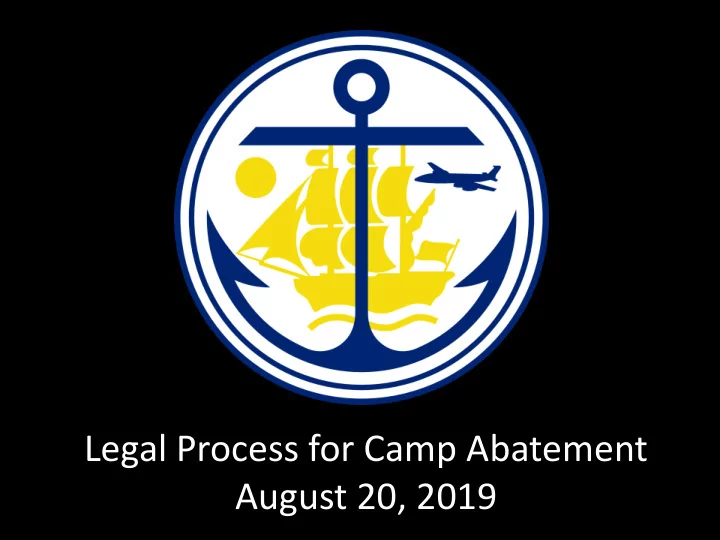

Legal Process for Camp Abatement August 20, 2019
What are the rules? • http://constitutionus.com/we_the_people_fb. jpg
Constitutional Rights of All Citizens “The right of the people to be secure in their persons, houses, papers, and effects, against unreasonable searches and seizures, shall not be violated, and no Warrants shall issue, but upon probable cause, supported by Oath or affirmation, and particularly describing the place to be searched, and the persons or things to be seized.” -Fourth Amendment, U.S. Constitution “Excessive bail shall not be required, nor excessive fines imposed, nor cruel and unusual punishments inflicted.” -Eighth Amendment, U.S. Constitution “All persons born or naturalized in the United States, and subject to the jurisdiction thereof, are citizens of the United States and of the State wherein they reside. No State shall make or enforce any law which shall abridge the privileges or immunities of citizens of the United States; nor shall any State deprive any person of life, liberty, or property, without due process of law; nor deny to any person within its jurisdiction the equal protection of the laws.” -Fourteenth Amendment, U.S. Constitution
Constitutional Rights, Continued “No person shall be deprived of life, liberty, or property, without due process of law. The right of all persons to fair and just treatment in the course of legislative and executive investigations shall not be infringed.” -Article 1, Section 7, Alaska Constitution “The right of the people to be secure in their persons, houses and other property, papers, and effects, against unreasonable searches and seizures, shall not be violated. No warrants shall issue, but upon probable cause, supported by oath or affirmation, and particularly describing the place to be searched, and the persons or things to be seized.” -Article 1, Section 14, Alaska Constitution “The right of the people to privacy is recognized and shall not be infringed. The legislature shall implement this section.” -Article 1, Section 22, Alaska Constitution
What do the Courts Say? Lavan v. City of Los Angeles , 693 F.3d 1022 (9th Cir. 2012)
“Violation of a City ordinance does not vitiate the Fourth Amendment’s protection of one’s property. Were it otherwise, the government could seize and destroy any illegally parked car or unlawfully attended dog without implicating the Fourth Amendment. Indeed, the Supreme Court has recognized protected possessory interests even in contraband . . . .”
“Let us be clear about the property interest at stake in this appeal: The district court did not recognize, and we do not now address, the existence of a constitutionally- protected property right to leave possessions unattended on public sidewalks. Instead, the district court correctly recognized that this case concerns the most basic of property interests encompassed by the due process clause: Appellees’ interest in the continued ownership of their personal possessions. . . . The City demonstrates that it completely misunderstands the role of due process by its contrary suggestion that homeless persons instantly and permanently lose any protected property interest in their possessions by leaving them momentarily unattended in violation of a municipal ordinance.”
Engle v. Municipality of Anchorage , Case No. 3AN-10-7047 CI
Engle v. MOA • Five business day notice period is inadequate and violates due process. Court “declines to dictate an appropriate time frame,” but calls attention to comparable provisions of Municipal Code in which the Municipality provides “a minimum of 10 to 15 days before classifying property as abandoned.” • “Valuable” property requiring storage deemed to include bedrolls, blankets, clothing, toiletry items, food, identification, a means for transporting the property (bag/box/suitcase/cart), family heirlooms, and belongings stored “in such a manner as to suggest ownership.” • “Protection of the public . . . is outweighed by the more immediate interests of the plaintiffs in not having their personal belongings destroyed.”
Martin v. City of Boise , 902 F.3d 1031 (9th Cir. 2018)
“Our holding is a narrow one. . . . We hold only that so long as there is a greater number of homeless individuals in a jurisdiction than the number of available beds in shelters, the jurisdiction cannot prosecute homeless individuals for involuntarily sitting, lying, and sleeping in public. That is, as long as there is no option of sleeping indoors, the government cannot criminalize indigent, homeless people for sleeping outdoors, on public property, on the false premise they had a choice in the matter”
“Naturally, our holding does not cover individuals who do have access to adequate temporary shelter, whether because they have the means to pay for it or because it is realistically available to them for free, but who choose not to use it. Nor do we suggest that a jurisdiction with insufficient shelter can never criminalize the act of sleeping outside. Even where shelter is unavailable, an ordinance prohibiting sitting, lying, or sleeping outside at particular times or in particular locations might well be constitutionally permissible.”
Martin v. Boise in the Courts • Shipp v. Schaaf , 379 F. Supp. 3d 1033 (N.D. Cal. 2019): 8-hour daytime closure to clean camp does not violate Martin . • Le Van Hung v. Schaaf , No. 19-CV-01436-CRB, 2019 WL 1779584 (N.D. Cal. Apr. 23, 2019): “clean and clear” of park does not violate Martin. • Quintero v. City of Santa Cruz , No. 5:19-CV- 01898-EJD, 2019 WL 1924990 (N.D. Cal. Apr. 30, 2019): where city offered either a shelter bed or a housing voucher to each resident of an encampment, abatement did not violate Martin.
Municipal Code – Abatement Options
Recommend
More recommend